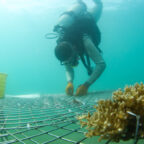
China is the largest fishing nation in the world. It is responsible for one-fifth of the world’s total marine fish catch. It is the world’s largest fish processor and trader, with huge influence on global seafood markets and the ecosystems they depend on. Actions China takes to manage its fisheries and economy can spill over to other countries and their marine ecosystems – something we need to understand better.
But today, fisheries in China and around the world are at a standstill. While demand for local seafood has increased in some areas, global seafood supply has been severely impacted by COVID-19. Billions of pounds of seafood that should be feeding the planet are piling up in cold storage as the pandemic keeps people away from restaurants and grocery stores and leaves fishing boats at the dock. Now more than ever, people are searching for answers about where their food comes from. As the crisis affects families and businesses worldwide, we can look for lessons and find ways to improve management of our seafood in the future.
China’s outsized influence
The massive scale of China’s seafood industry allows it to exert great influence on global fisheries and ocean biodiversity. The good news is that in recent years, marine ecosystem sustainability has emerged as a high priority in Chinese national policy. The government is taking important steps to monitor and conserve its fish populations. Because China connects so many different seafood markets around the world, the impacts could reach far beyond Chinese waters. However, we lack a good understanding of China’s connections to global seafood markets. Improved understanding of China’s global connections can help shape ocean conservation policy decisions that reverberate around the world.
EDF has been working with researchers at Peking University in China in order to come up with answers to three key questions:
- What are the most important fish species to China’s economy? Are these managed sustainably?
- How are fishing communities around the world linked through Chinese seafood production and trade?
- How do China’s domestic fisheries management and conservation efforts spill over and impact marine ecosystems and fishing communities around the world?
What we can learn from China
Today, we are examining the impacts of China’s fishery management decisions on seafood processing and trade. As our research evolves, we are learning how one action can affect so many. A months-long ban on ocean fishing in China each year leaves the world’s largest fishing fleet tied up at the docks, bringing in a surge of fish imports. This means the Chinese seafood industry depends on sustainable fisheries management among its many trading partners, especially as it tries to rebuild its own fish populations through tighter policy restrictions. Millions of tons of fish enter China each year, feeding a mix of growing domestic consumption and processing for export. With these connections mapped out, we can see how the current disruption in seafood supply chains caused by COVID-19 will have long-lasting impacts on food production and fishing livelihoods.
Through our partnership with Peking University, we are helping to develop much-needed policy expertise within China by building its first university fisheries economics program. Policymakers in China closely monitor the seafood industry, and research and international experience demonstrate that fisheries management systems most favorable to the fishing economy in China will be the ones that promote conservation. Together with Peking University, we are making a compelling economic case for conservation in China, linking seafood production and livelihoods to sustainability of fisheries worldwide.
Looking ahead, we continue to see tremendous value in facilitating research networks between leading Chinese universities, their U.S. university counterparts and NGOs. Helping Chinese researchers and students secure international exposure to important conservation issues will elevate their profile and career prospects and will help us bring global best practices in fisheries conservation to the attention of influential leaders in China.
Decisions they make could have unmatched influence on seafood markets, and steps they take to conserve fish populations will help sustain ocean health, fishing livelihoods and food supplies around the world.
Source















Social Profiles